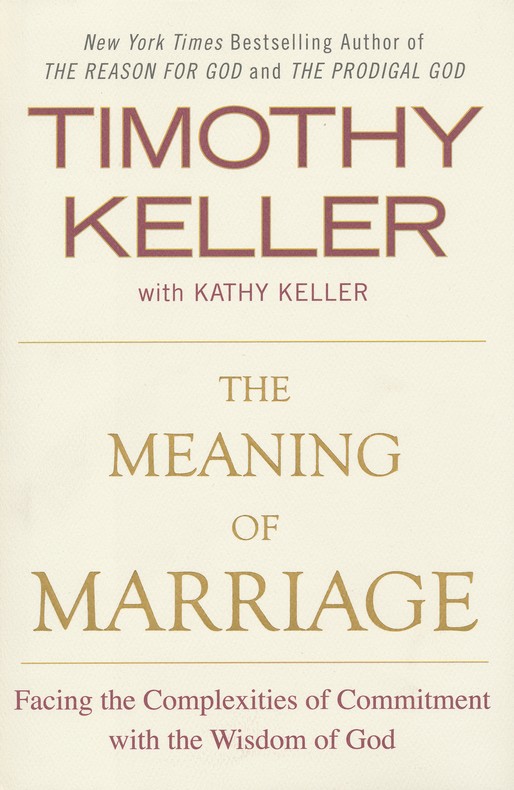 Thanks to everyone who joined our book of the month club for February! Our selection was The Meaning of Marriage, which I introduced here.
Thanks to everyone who joined our book of the month club for February! Our selection was The Meaning of Marriage, which I introduced here.
Here’s how it works: I’ll bring up a few discussion topics, and I’d love to hear your reactions! You can put your thoughts about these topics (or others you’d like to talk about) in the comment section.
Discussion #1: The Purpose of Marriage
I found the Kellers’ perspective on marriage counter-cultural and refreshing. Marriage is not, they claim, about making us happy. It’s about making us more into the people God intended us to be.
What, then, is marriage for? It is for helping each other to become our future glory-selves, the new creations that God will eventually make us. (page 120)
Within this Christian vision for marriage, here’s what it means to fall in love. It is to look at another person and get a glimpse of the person God is creating, and to say, “I see who God is making you, and it excites me! I want to be part of that.” (page 121)
What do you think the purpose of marriage is? In what ways have you seen marriage transform you or someone you know into your “future glory-self”?
Discussion #2: Marriage as a picture of the gospel
One of my favorite themes in the book is that marriage, at its core, is a reflection of the gospel. Taken from that perspective, the hardest seasons in a marriage become purposeful, and the good parts become infused with meaning.
When over the years someone has seen you at your worst, and knows you with all your strengths and flaws, yet commits him- or herself to you wholly, it is a consummate experience. To be loved but not known is comforting but superficial. To be known and not loved is our greatest fear. But to be fully known and truly loved is, well, a lot like being loved by God. (page 95)
Marriage has the power of truth, the ability to reveal to you who you really are, with all your flaws. How wonderful that it also has the “power of love”—an unmatched power to affirm you and heal you of the deepest wounds and hurts of your life. (page 146)
To be truly known and truly loved—this is grace. How have you seen marriage as a picture of the gospel in your life or in the lives of those you know?
Discussion #3: Submission
I was pleasantly surprised to see that the book isn’t prescriptive about what submission should look like in individual marriages. I also appreciated that it rises above the usual skirmishes about surface-level submission and digs deeper into the theology behind it.
I especially resonated with the analogy of the marriage relationship as a reflection of the Trinity. Ideally, God intended marriage to be an invitation for “male and female…to mirror and reflect the ‘dance’ of the Trinity” (page 176). Put in that perspective, submission gets taken out of the context of power and put into the context of choice. Kathy puts it this way:
Jesus’s willing acceptance of this role was wholly voluntary, a gift to his Father. I discovered here that my submission in marriage was a gift I offered, not a duty coerced from me. (page 175)
What do you think of the idea that submission is a reflection of the interaction between the Father, Son, and Holy Spirit? What do you think the authors get right in their exploration of submission, and what would you take issue with?
Discussion #4: Singleness
I was glad to see that this book includes a chapter on singleness since it’s valuable for all of us to have a solid theology of marriage, whether we’re married or not. But I have to say I was disappointed that single people seemed to be categorically lumped into two camps: those who idolize marriage and those who are terrified of it.
I couldn’t help but feel for the healthy, well-balanced people I know who aren’t married but would like to be. They aren’t under the illusion that marriage will be perfect or will solve all their problems, nor are they running away from marriage. Certainly some people fall into those categories, but I found myself bristling on behalf of anyone who reads this and feels like their singleness is being pushed back on them as their own fault.
What do you think? Did this chapter present an accurate picture of singleness in our culture?
Rating: ★ ★ ★ ★ ★
Not including the chapter on singleness, I would give this book five stars. I appreciated that it is both theological and practical, that it casts a sweeping vision for marriage yet is still rooted in the real world. I’d recommend it to everyone I know who is married or is considering marriage.
How many stars would you give this book?
{Reminder: I will give away a free book to one randomly selected commenter!}
